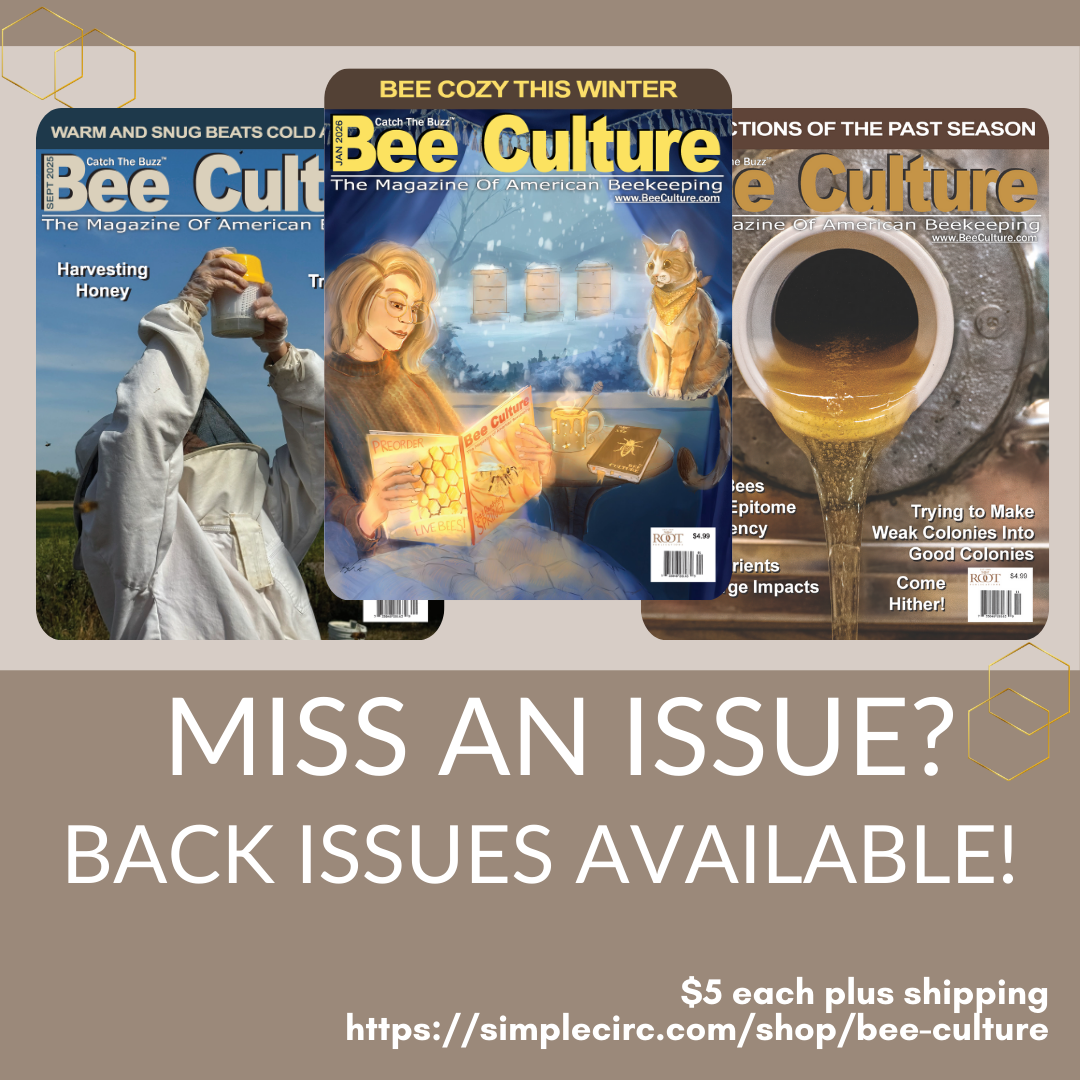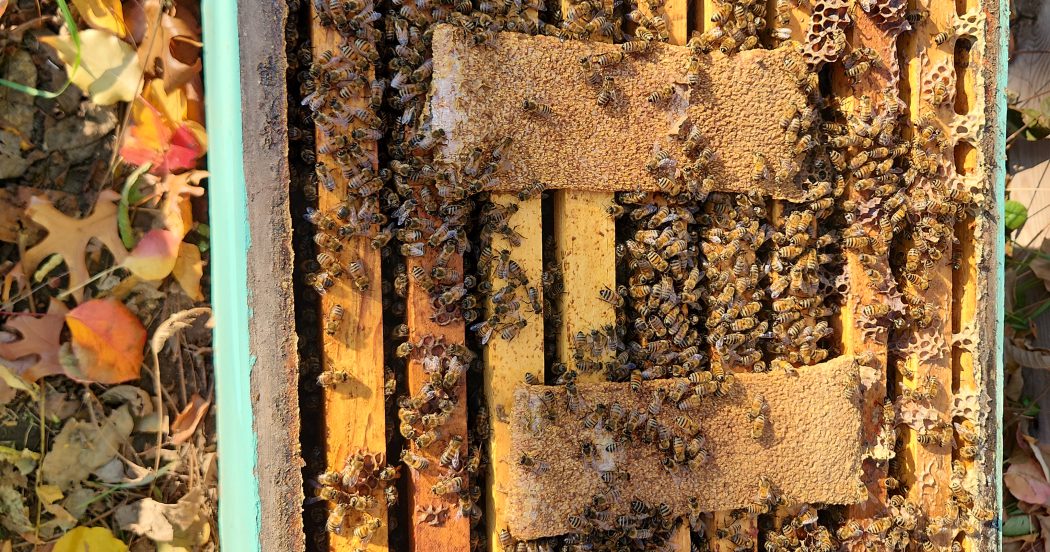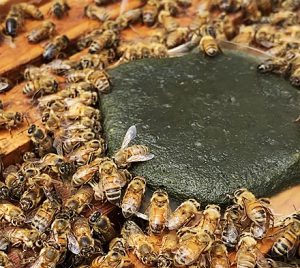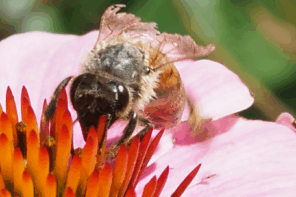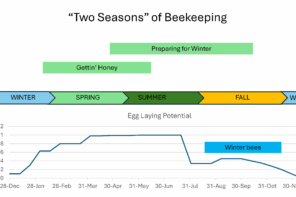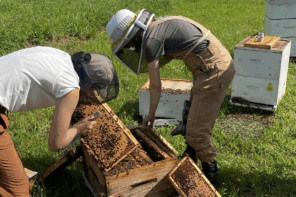Click Here if you listened. We’d love to know what you think. There is even a spot for feedback!
Read along below!
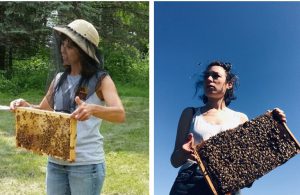
Becky Masterman earned a PhD in entomology at the University of Minnesota and is currently a host for the Beekeeping Today Podcast. Bridget Mendel joined the Bee Squad in 2013 and led the program from 2020 to 2023. Bridget holds a B.A. from Northwestern University and an M.F.A. from the University of Minnesota. Photos of Becky (left) and Bridget (right) looking for their respective hives. If you would like to contact the authors with your counting stories, please send an email to mindingyourbeesandcues@gmail.com
Minding Your Bees and Cues
A Survey of Newsworthy Bees
By: Becky Masterman & Bridget Mendel
This year bees in the news got off to a dramatic start1 with unprecedentedly high rates of bee theft during almond pollination in California. As we face the end of the calendar year, we thought we’d have a look through popular bee themed articles over 2024, a survey of the kinds of drama these sweet little beings have inflicted on the human populace this time.
While some nefarious folks made news by stealing bees, other unsavory types made news by leaving unwanted bees.2 While we would be delighted by a deposit of adorable honey bees outside our door, for non-beekeepers this would clearly be a terrifying experience. Politically speaking, we’re for keeping bees as inspiration for a well-functioning democracy, not ploys for pettiness.
Across the globe in Korea, bees are participating in politics in a more successful way.3 In a recent Times article, beekeepers in the Demilitarized Zone between North and South Korea spoke poetically of their bees’ ability to transcend borders that are restricted for humans. They forage on land that’s still riddled with landmines; the resulting honey contains flavors from many wildflowers, and also the bittersweet longing of Koreans who have been cut off from their ancestral lands.
The question of whether bees possess consciousness4 is a tricky one (what is consciousness?) but Prof Lars Chittka of Queen Mary University of London thinks that “Given all the evidence that is on the table, it is quite likely that bees are conscious.” Studies that show bees’ ability to recall, to play and use tools, appear to back up this statement. While other researchers remain unconvinced, the topic is an irresistible one to any conscious reader.
Honey bees are well known for their industriousness, but this year they took it to the next level, making June news as fighters of both crime and cancer. Forensic researchers in Virginia5 are essentially studying the volatile acids bees pick up while foraging near dead and decomposing bodies, in order to develop a correlative process whereby bees near a local crime scene can be assessed by detectives for evidence of a corpse.
Meanwhile, in Michigan, bees themselves are proving good little detectives — this time for lung cancer.6 Researchers have found that honey bees can detect chemicals associated with lung cancer in the human breath, and can even differentiate between types of lung cancer. As beekeepers, we know that smell is a powerful communication tool for bees, and that they use smell to detect volatiles associated with death and disease in their brood nests. We’re curious to learn that Michigan researchers found the bees could “not only detect cancer cells, but also distinguish between cell lines of various types of lung cancer. It suggests that bees could be detecting particular diseases in their hive, rather than simply reacting to a general signal of health or disease.
It seems that, like other years, the media continues to oscillate between doom for bees and a sort of meta-drama around the idea that we’re unnecessarily worried about bees. From dramatic reveals about how we should be worried about native bees instead of honey bees,7 to how honey bees are doomed by increasingly long and warm Falls in northern climates.8
Australian beekeepers are facing the new reality of managing Varroa destructor after the eradication path proved to be unsuccessful. Over two years into the varroa invasion, the beekeepers who waited decades to detect varroa on their island are needing to add mite mitigation to their beekeeping regimes or end their operations9
Dr. Vincent Ricigliano, Research Entomologist at the Baton Rouge, Louisiana USDA Bee Lab, is making waves with using blue-green algae or microalgae as a colony nutritional supplement.10 The supplement is effective in reducing viral levels, but beekeepers need to wait for it to come to market. A patent has been applied for and commercial beekeepers have been enlisted to participate in this research.
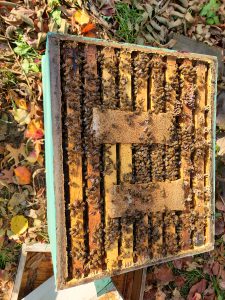
Most U.S. beekeepers don’t haven’t experienced pre and post varroa beekeeping. Australian beekeepers now have to decide if they want to live through it and the varroa management necessary to maintain healthy colonies. Photo credit: Rebecca Masterman
Lastly, the hot honey trend held on and went big in 2024. It infiltrated martinis, coffee drinks and ice cream to name a few unexpected items. While certain brands seem to have a corner on the market, we think every beekeeper should have their own take on a hot honey recipe.11
What will next year bring? Hot honey drizzled on pancakes? Drones sitting in boardrooms? Will bees, possessing consciousness, begin leading meditation retreats? We’re sure that bees will be writing newsworthy poems in 2025. As we write this, the American presidential election is undecided. By the time you read this, who knows? There could be a honey bee for president.
1https://abcnews.go.com/US/beehives-stolen-california-central-valley/story?id=107031950
2https://www.newsweek.com/texas-republican-swarmed-bees-blames-opponents-allies-1903410
3https://www.nytimes. com/2024/08/24/world/asia/south-korea-dmz-honey.html
4https://www.bbc.com/news/articles/cv223z15mpmo
5https://www.nytimes.com/2024/06/21/science/body-donation-farm-virginia-death-scent.html?searchResultPosition=4
6https://msutoday.msu.edu/news/2024/msu-researchers-discover-honeybees-can-detect-lung-cancer
7https://www.vox.com/down-to-earth/2023/1/19/23552518/honey-bees-native-bees-decline
8https://www.usnews.com/news/health-news/articles/2024-03-26/warmer-autumns-may-doom-hardworking-honey-bees
9https://www.theguardian.com/australia-news/article/2024/sep/05/its-inevitable-australian-beekeepers-brace-for-national-spread-of-varroa-mite
10https://www.ars.usda.gov/news-events/news/research-news/2024/usda-researchers-use-an-edible-blue-green-algae-to-protect-honey-bees-against-viruses/
11https://www.nytimes.com/2024/05/08/dining/hot-honey.html?searchResultPosition=3

